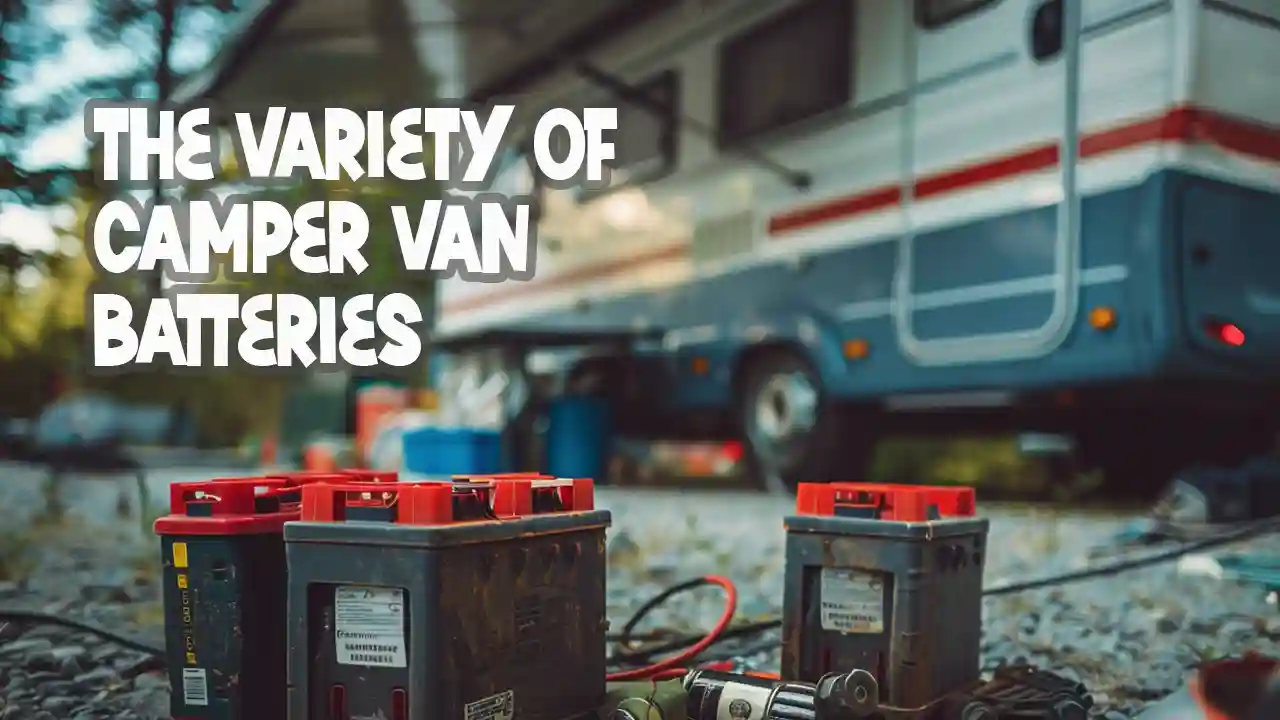
The Variety of Camper Van Batteries
Introduction
Welcome, dear enthusiasts of camper van life and nomadic living! Today, we delve into a crucial topic at the heart of every camper van adventure: batteries. Whether you’re an occasional traveler or a seasoned road warrior, the choice of battery for your camper van can greatly influence your travel experience.
In this article, we will explore the various battery options available – from traditional lead-acid to innovative lithium batteries, including AGM and gel batteries. We will discuss their advantages, disadvantages, and how they fit various camper van lifestyles and needs.
Whether you’re looking to maximize your autonomy, minimize maintenance, or simply understand which type of battery would best suit your vehicle, this article serves as your comprehensive guide.
Basic Principles of Camper Van Batteries
Firstly, let’s delve into the lexicon of these essential components to ensure clarity, as they lie at the heart of your journeys, allowing you to enjoy the comforts of your home on wheels independently.
Key Terms to Know
Let’s start by deciphering the key terms of our subject:
- Capacity: Measured in ampere-hours (Ah), this indicates the amount of energy stored in the battery. The higher the capacity, the longer you can use your devices without recharging.
- Voltage: Measured in volts (V), it determines the ‘strength’ of the battery. Camper vans typically use batteries of 12V or 24V.
- Charge Cycles: They represent the number of times you can charge and discharge the battery before it starts to lose efficiency.
Different Types of Batteries
There are several types of camper van batteries, each with its own advantages:
- Flooded Lead-Acid Batteries: The most common and least expensive, they require regular maintenance, including filling with distilled water and installation in a ventilated space.
- AGM (Absorbent Glass Mat) Batteries: More expensive but maintenance-free, they offer better performance in extreme temperatures and greater resistance to vibrations.
- Gel Batteries: Similar to AGM, these batteries are fully sealed and do not require ventilation. They are ideal for unventilated spaces but are more sensitive to improper charging.
- Lithium-Ion (LiFePO4) Batteries: The most technologically advanced, they are lighter, have a longer lifespan, and require no maintenance, but are more expensive.
Each type of battery has its own characteristics in terms of lifespan, discharge capacity (typically 50% for lead-acid and up to 80% or more for lithium), and maintenance level required. (Tip: Consider your travel habits and budget when choosing your battery.)
Types of Camper Van Batteries
Lead-Acid Batteries
Lead-acid batteries are a proven and widely used solution in the world of camper vans. They are essential for those seeking reliability and accessibility. Let’s examine their characteristics and operation.
Operation and Characteristics
Lead-acid batteries operate through a reaction between lead and sulfuric acid. They are available in two main types: starting batteries, which provide a burst of energy to start the engine, and deep-cycle batteries, ideal for powering long-term electrical equipment. These batteries contain lead plates and are immersed in an electrolyte, requiring installation in a well-ventilated space. (Tip: Ensure secure mounting to avoid risks associated with emitted gases).
Advantages and Disadvantages
Their greatest advantage is their relatively low cost, making lead-acid batteries accessible to most camper van users. They are robust and can withstand a respectable number of charge/discharge cycles.
However, they require regular maintenance, such as checking the level of distilled water, and must be stored in a ventilated area to prevent gas buildup. (Tip: Always adhere to safety standards when handling these batteries) Their weight and limited discharge capacity (about 50%) can be constraints for some users, especially those planning extended off-grid stays.
AGM (Absorbent Glass Mat) Batteries
AGM (Absorbent Glass Mat) batteries have become a popular choice in camper vans, offering a balanced combination of performance and convenience.
Description and Operation
AGM batteries operate using a technology where the electrolyte is absorbed into a fiberglass mat. This innovative design makes them leak-resistant and allows for flexible installation. They share design characteristics with flooded lead-acid batteries but stand out for their maintenance-free nature and ability to operate without specific ventilation. (Tip: Ideal for configurations where space is limited or unventilated).
Advantages and Disadvantages
AGM batteries are appreciated for their maintenance-free nature, eliminating the need to add water and manage leaks. They are more resistant to extreme temperatures and vibrations, making them ideal for journeys across diverse terrains. Their ability to hold a charge longer during extended periods of inactivity provides an additional advantage, especially for those who use their camper van seasonally.
However, AGM batteries come with a higher initial cost compared to traditional lead-acid batteries. Additionally, they are sensitive to overcharging and may require special chargers to maximize their lifespan. (Tip: Use a charger tailored to AGM batteries to avoid damaging the battery) Although their weight is similar to that of lead-acid batteries, they may not be suitable for all budgets or configurations.
Gel Batteries
Gel batteries offer an intriguing alternative to traditional types of batteries for camper vans. Let’s explore their unique operation and advantages for certain uses.
Operation and Special Features
Unlike conventional lead-acid batteries, gel batteries use silica gel to immobilize the electrolyte. This innovative design converts the acid into a thick substance, making the battery virtually leak-proof. This feature makes them particularly suitable for use in spaces where leak protection is paramount. (Tip: Perfect for installations in restricted or hard-to-access areas) However, it’s important to note that gel is sensitive to high temperatures and high charging currents, which can lead to gel hardening and a reduction in the battery’s discharge and recharge capacities.
Advantages and Disadvantages
Gel batteries stand out for their maintenance-free nature and leakproof design. They don’t require special ventilation and don’t need regular monitoring, making them ideal for unventilated spaces and uses where maintenance is challenging. Additionally, they withstand cold temperatures well and can have an extended lifespan if used and charged correctly.
However, gel batteries have a higher initial cost compared to lead-acid and AGM batteries. Their sensitivity to overcharging requires special care during charging to avoid damaging the gel. Additionally, their weight is similar to other lead-acid batteries, and they are limited to a maximum discharge of 50% of their rated ampere-hour capacity to prevent significant damage.
Lithium Batteries
Lithium batteries are often considered the most advanced option for camper vans, thanks to their outstanding performance and efficiency.
Why They’re Considered an Advanced Option
Lithium batteries, especially Lithium-Ion models, are renowned for their lightweight and high energy capacity. They weigh approximately half as much as a lead-acid battery of the same size, reducing the overall weight of the camper van. Additionally, they can be discharged up to 80% or more of their capacity without significant damage, providing greater utilization of their total capacity compared to lead-acid batteries, which should not be discharged below 50%.
Advantages and Disadvantages
The advantages of lithium batteries include a long lifespan, often estimated between 10 and 20 years, and a greater amount of usable energy compared to lead-acid batteries of the same size. They do not require regular maintenance, such as filling water, and can be installed in any position. Their recharge time is also shorter, which is advantageous for frequent travelers.
The initial cost of lithium batteries is typically higher than that of other types of batteries. They also require specialized charging equipment to maximize their lifespan and prevent damage. Additionally, they cannot be recharged in temperatures below 32°F (0°C), which can be a disadvantage in certain cold climates.
Comparison of Camper Van Battery Types
We have individually explored the various types of batteries for camper vans, each with its own characteristics and advantages. To help you visualize these differences more concretely, here’s a comparative table highlighting capacity, lifespan, cost, and maintenance for each battery type. This table provides a clear overview, allowing you to easily compare lead-acid, AGM, gel, and lithium batteries. Additionally, to illustrate how these characteristics translate into real-world situations, we have included examples of optimal use for each battery type.
Summary Table
| Battery Type | Capacity | Lifespan | Cost | Maintenance |
|---|---|---|---|---|
| Lead-Acid Batteries | Average | 3-6 years | Low | High (requires regular water filling) |
| AGM Batteries | High | 4-8 years | Medium | Low (maintenance-free) |
| Gel Batteries | Medium to High | 2-5 years | Medium to High | Low (maintenance-free) |
| Lithium Batteries | Very High | 8-10 years or more | High | Very Low (maintenance-free) |
Examples of Optimal Use for Each Battery Type:
- Lead-Acid Batteries: Ideal for occasional campers or those on limited budgets, perfect for short trips where the camper van is frequently connected to an external power source.
- AGM Batteries: Suitable for campers seeking a balance between cost and performance with minimal maintenance. Ideal for longer trips and rugged terrains.
- Gel Batteries: A good choice for users requiring a maintenance-free and reliable battery, particularly suited for environments where acid leaks may be problematic.
- Lithium Batteries: Perfect for frequent or full-time campers, offering the best performance and lifespan. Ideal for solar systems and long-term off-grid uses.
EcoFlow Batteries
As a daily user of camper van batteries, I highly recommend EcoFlow batteries for their versatility and ease of use. Based on lithium-ion technology, these batteries are an ideal choice for various camper van applications.
My Experience with EcoFlow Batteries
EcoFlow batteries represent much more to me than just a battery choice; they embody ease and flexibility in energy management for my camper van. What sets these batteries apart is their all-in-one design. They not only incorporate energy storage but also intelligent charge management and integrated solar options for optimal autonomy. (Tip: With EcoFlow, the era of complicated setups and multiple equipment is over).
Overview of EcoFlow Batteries
EcoFlow batteries stand out for their all-in-one design, offering a comprehensive energy management solution. They integrate both energy storage, charge management, and solar options, making them particularly suitable for the varied needs of camper vans. Their lithium-ion technology provides high energy density and long lifespan, making them more efficient than traditional lead-acid or AGM batteries.
Ease of Use and Suitable Models
EcoFlow batteries are known for their ease of installation and use. They are available in different models to fit both small vans and large camper vans. With EcoFlow, you get a reliable energy solution, no matter the size of your vehicle. Popular models like those in the Delta series (such as Delta 2 or Delta Pro) offer an excellent combination of capacity and portability, ideal for occasional campers or those living full-time on the road.





